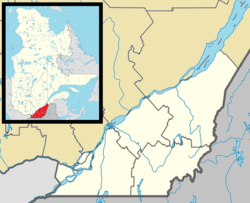Laurierville, Quebec
You can help expand this article with text translated from the corresponding article in French. (July 2018) Click [show] for important translation instructions.
|
Laurierville | |
|---|---|
 Aerial view of Laurierville | |
 Location within L'Érable RCM. | |
| Coordinates: 46°18′N 71°39′W / 46.300°N 71.650°W[1] | |
| Country | |
| Province | |
| Region | Centre-du-Québec |
| RCM | L'Érable |
| Constituted | November 26, 1997 |
| Government | |
| • Mayor | Marc Simoneau |
| • Federal riding | Mégantic—L'Érable |
| • Prov. riding | Arthabaska |
| Area | |
• Total | 108.80 km2 (42.01 sq mi) |
| • Land | 107.91 km2 (41.66 sq mi) |
| Population (2021)[3] | |
• Total | 1,313 |
| • Density | 12.2/km2 (32/sq mi) |
| • Pop 2016-2021 | |
| • Dwellings | 605 |
| Time zone | UTC−5 (EST) |
| • Summer (DST) | UTC−4 (EDT) |
| Postal code(s) | |
| Area code | 819 |
| Highways | |
| Website | www |
Laurierville is a municipality in the Centre-du-Québec region of the province of Quebec in Canada.
It was constituted on November 26, 1997 by the amalgamation of the village municipality of Laurierville and the municipality of Sainte-Julie (the latter not to be confused with a different, modern-day Sainte-Julie in Montérégie). Laurierville contains the new storage warehouse of the Federation of Quebec Maple Syrup Producers.
History
[edit]At the beginning of the 19th century, the area was still entirely unspoilt. At that time, that open territory, south of the Bécancour River, was known as Somerset. The first settler in the area was Laurent Poliquin, who cleared a 4-acre parcel of land on what is now the 9th rang. Others arrived in the early 1840s. They named the area Rivière-Noire, after the stream that ran through their land. In 1845, the Sainte-Julie-de-Somerset mission was founded. The first chapel was built in 1852, and the first parish priest, Édouard Dufour, settled there in 1854.
On January 1, 1855, the municipality of Sainte-Julie-de-Somerset was officially created. Three years later, in 1858, the name was changed to Somerset-Nord The same year, on November 17, the parish of Sainte-Julie-de-Somerset was canonically erected. A post office was opened in 1860. Gradually, the parish's nucleus gradually grew into a village. On 19 December 1902, the village became an independent legal entity and took the name of Laurierville. It was named Laurierville in honour of Wilfrid Laurier, then Prime Minister of Canada. The name was one of a generation of toponymic names with the suffix -ville given to several municipalities in Centre-du-Québec during those years. The church was built between 1909 and 1911 to plans by architect Joseph-Pierre Ouellet.[1]
Meanwhile, the municipality of Somerset-Nord, fully surounding Laurierville, changed its name to Sainte-Julie in 1950. Finally, the current municipality of Laurierville was officially created in 1997 when Laurierville and Sainte-Julie merged together. In 2017 Laurierville celebrated their 20 years of existence.
Notable people
[edit]- Fernand Labrie, medical researcher[4]
- Marie-Rose Turcot, writer[5]
References
[edit]- ^ a b "Banque de noms de lieux du Québec: Reference number 337655". toponymie.gouv.qc.ca (in French). Commission de toponymie du Québec.
- ^ a b "Répertoire des municipalités: Geographic code 32072". www.mamh.gouv.qc.ca (in French). Ministère des Affaires municipales et de l'Habitation.
- ^ a b "Profile table, Census Profile, 2021 Census of Population - Laurierville, Municipalité (MÉ) [Census subdivision], Quebec". 9 February 2022.
- ^ Biron, Pierre-Paul (2019-01-17). "Décès d'un grand chercheur québécois". Le Journal de Québec. Retrieved 2020-04-01.
- ^ "Marie-Rose Turcot 1887-1977 - Historical background". Ontario Heritage Trust. 2019-12-19. Retrieved 2020-04-01.

